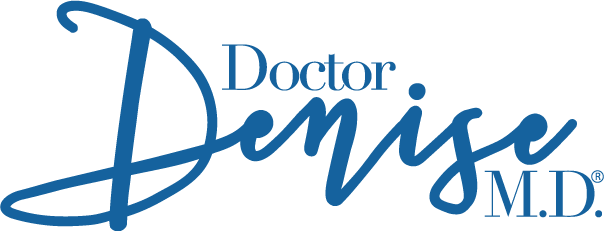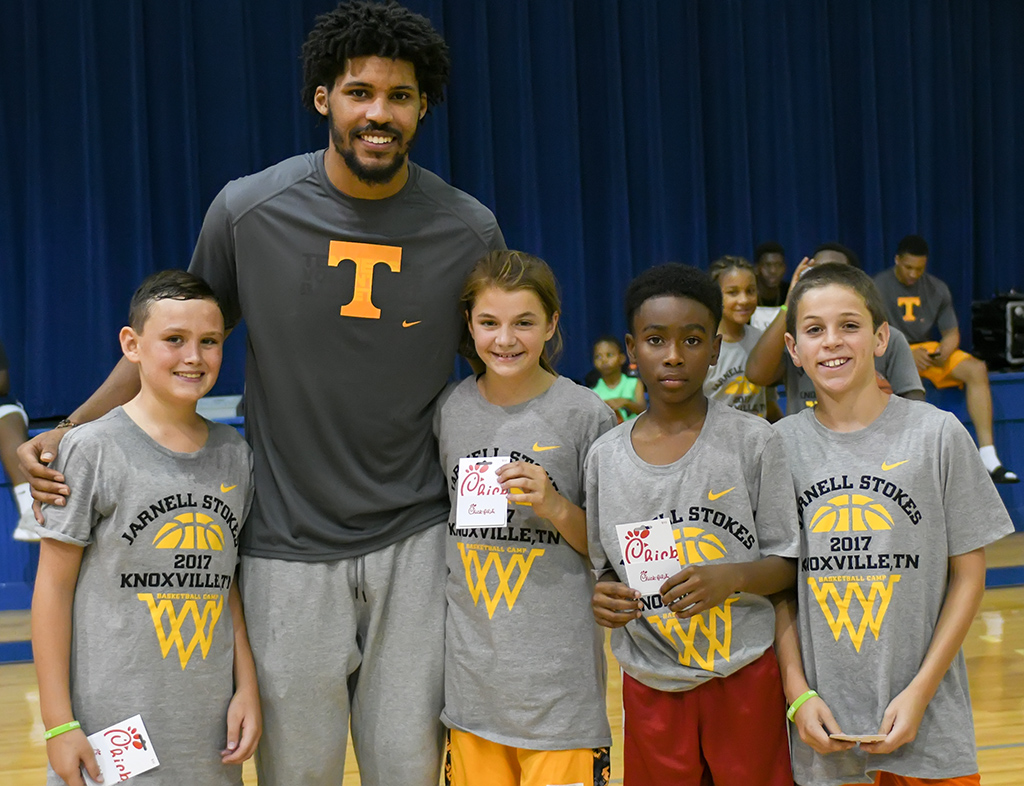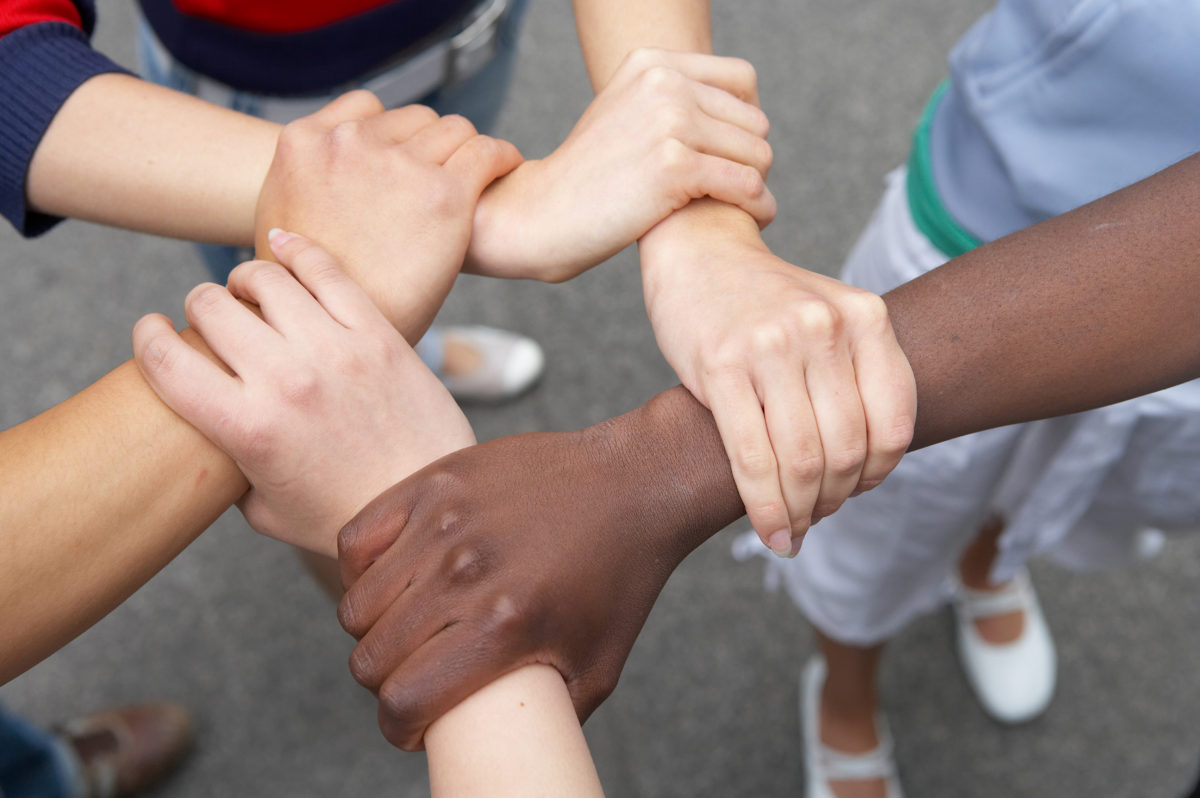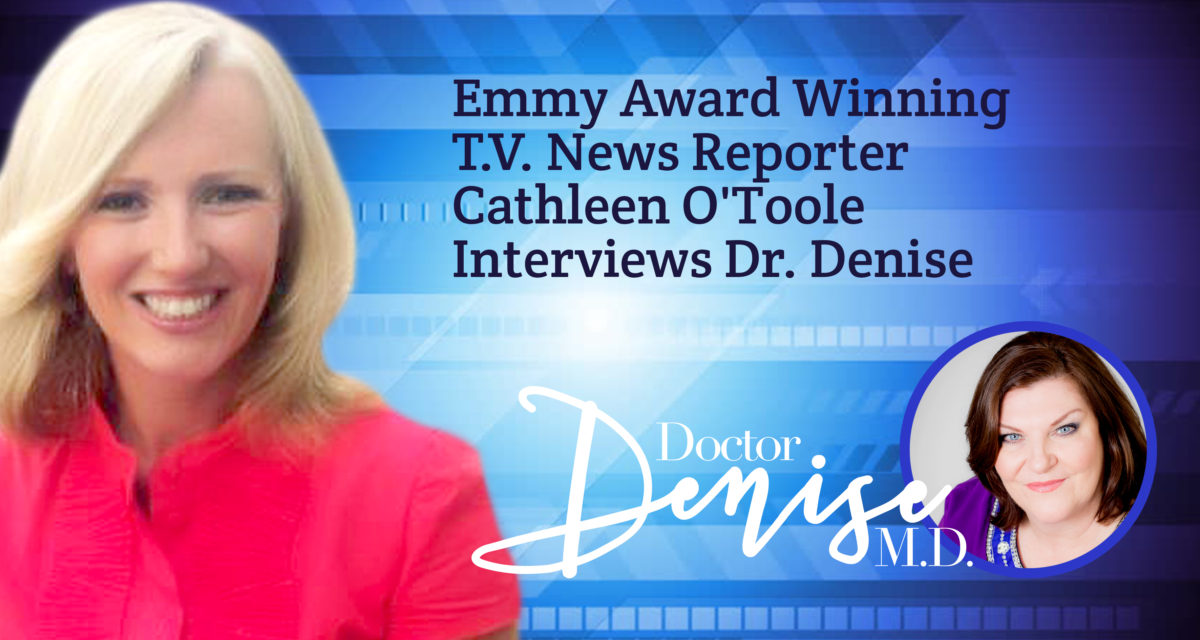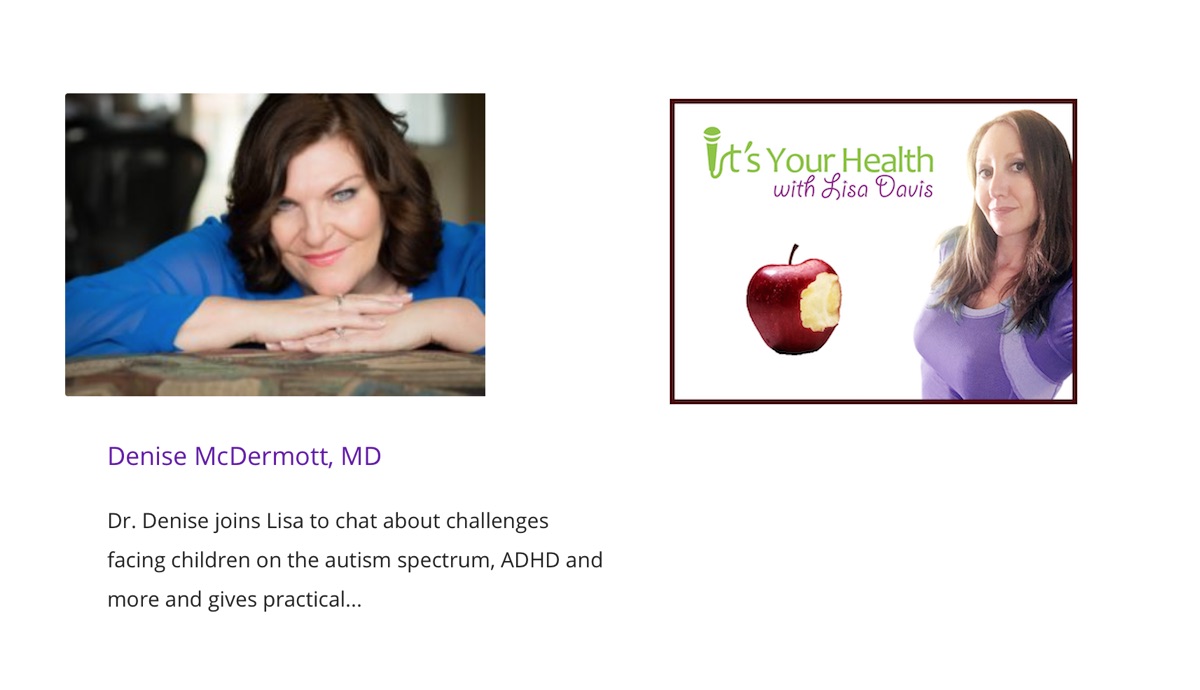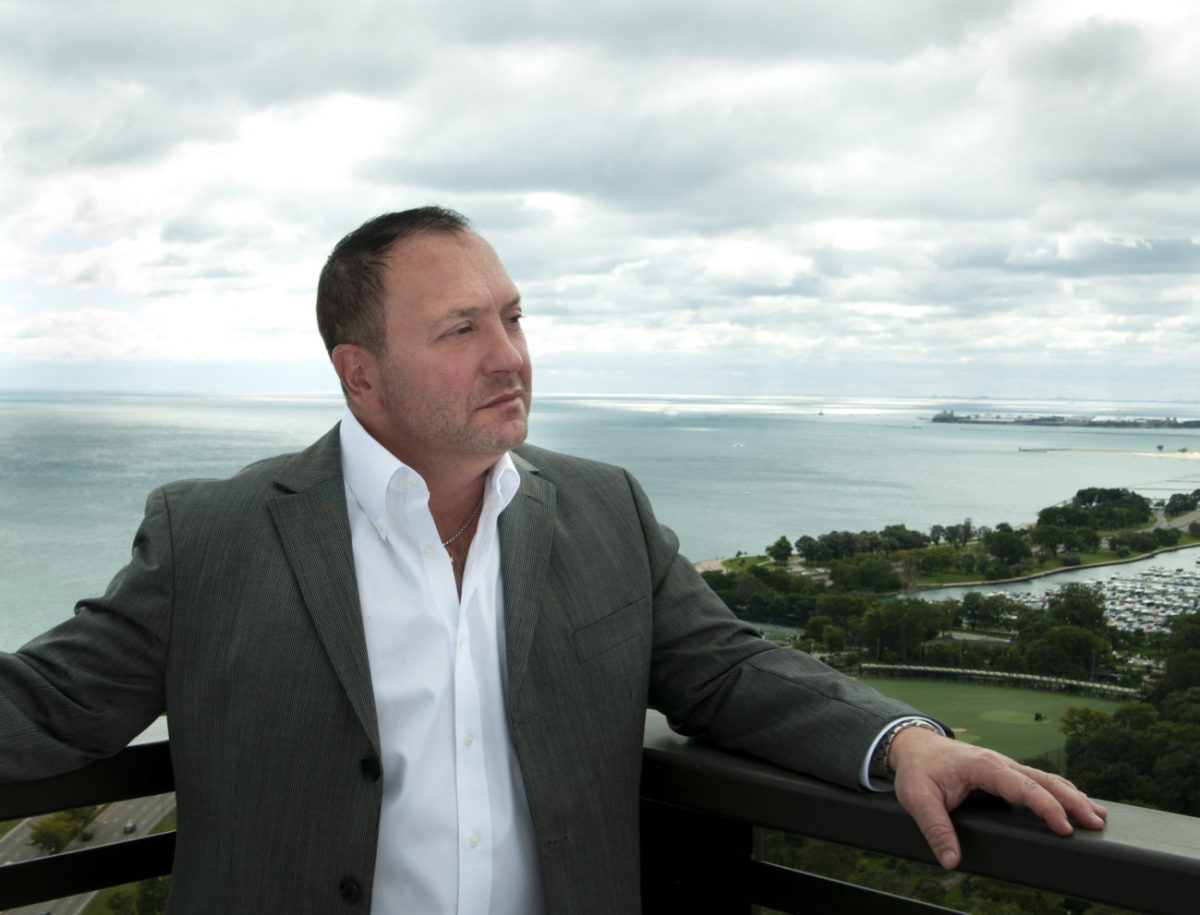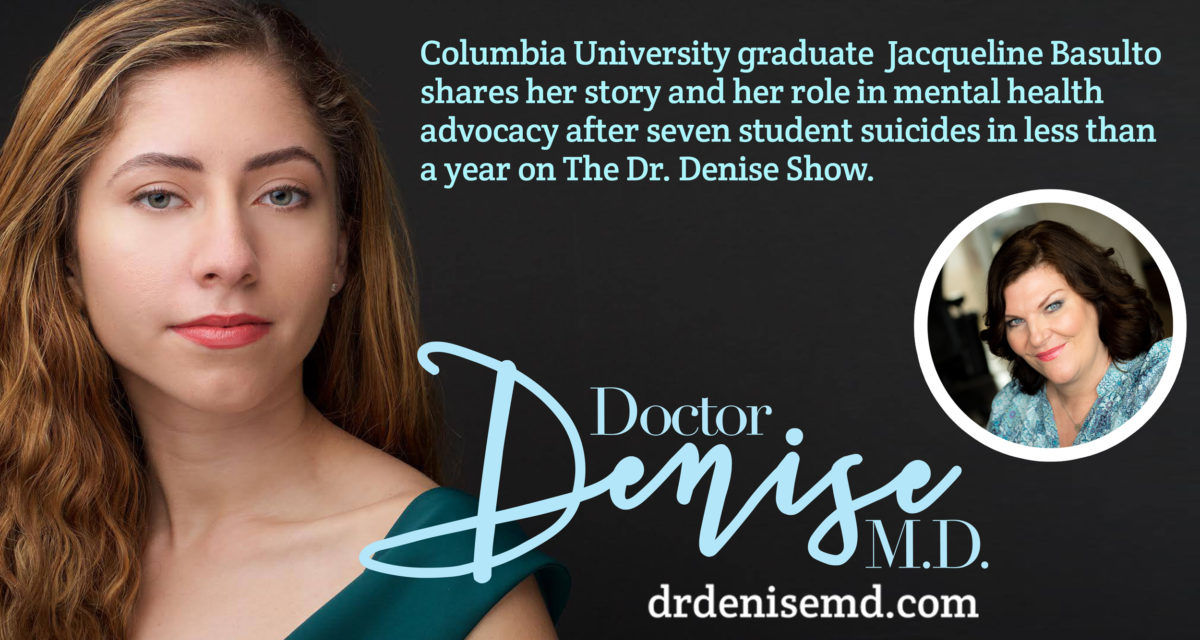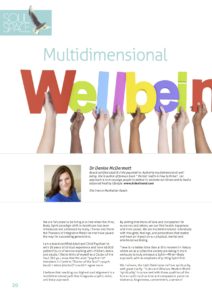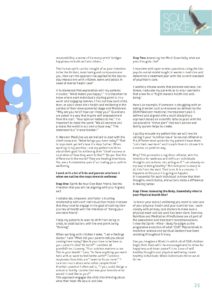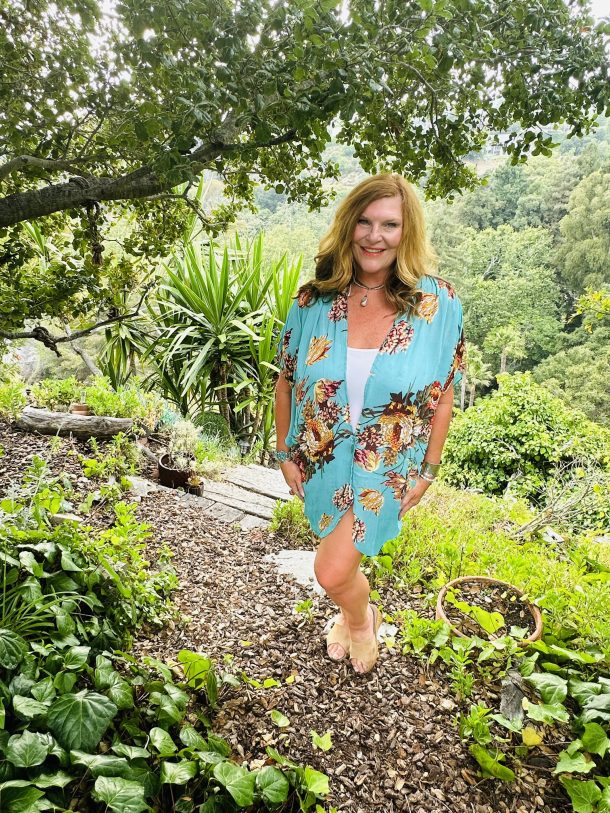Here is the transcription of my interview with Jacqueline on 6/17/17.
You will shed tears, be inspired and want to take action! Thank you Jacqueline.
~Dr. Denise
Dr. Denise: This is the Dr. Denise Show. I’m doctor Denise McDermott, an adult and child psychiatrist, specializing in an integrative approach to mental health. I believe in prescribing the least amount of medication, coupled with a comprehensive treatment plan. My goal is to empower you to thrive and I take a multidimensional approach to wellness, not illness. You are not your symptoms. Call upon your best and highest self to embrace your mental health. On this program you will meet many doctors, experts and pioneers who have helped pave the way to shift the paradigm of getting rid of the stigma of mental illness in our society. This show was created for those of you who would like new ways of thinking and understanding about mental health and helping your loved ones to thrive and cope in empowered ways.
Today I have the honor of interviewing Jacqueline Basulto. She’s a recent graduate of Columbia University. After witnessing seven student deaths in less than a year, and experiencing mental health challenges her self, Jacqueline felt the need to do something to change the way higher education institutions handle psychological illnesses. Today, Jacqueline lives in Manhattan, is the founder of the mobile application GeoPlay, and runs an educational company called Knowledge EDU. Good morning, Jacqueline.
Jacqueline: Good morning.
Dr. Denise: Thank you so much for connecting with me and being on the show today.
Jacqueline: Of course, thank you for having me.
Dr. Denise: I met Jacqueline, I was going through my Twitter feed, and just looking at different articles, and I met Jacqueline earlier this year. I was reading an article and there had been the quote in the news article, it was called, “Suicide at Columbia and the Urgency of Prevention in the Columbia Spectator.” And Jacqueline had said in the quote, when people are dealing with mental health diseases, it’s important to know that others are, too. So, if there was a more open dialogue about it, people would feel less alone and there would be empathy on campus. We need the professors, the student body, and the administration all working together to change the culture of our campus. That’s something you had said in that article and you had also told the New York Post that Columbia has a really hostile, competitive culture.
And then, when I read your articles, I was like, “Wow, I really need to reach out to Jacqueline and really get this conversation going.” And, Jacqueline, I want to let you know since December 1st of last year, I have now had 9 people in my practice that have been suicidal or referred to me. And 7 of the 9 are under age 18. So, I actually said a prayer before I did this interview because I know for those listening that it was going to be a very important interview, but I also wanted to honor all of you out there listening and all of people who have crossed to the other side, that this is a really serious topic and it’s near and dear to my heart.
And Jacqueline I would love just for you to comment a little further about your experience in the last year, and your desire to be the change and raise awareness for the importance of mental health.
Jacqueline: Sure. So, it all started last year mostly, I mean my entire life I have suffered with anxiety issues, but last fall it turned into something much more severe. I didn’t know at the time, but I had clinical depression, and I was so unlike myself. And every day I would just wake up and feel horrible, and I was no longer alive and there was no more purpose to me. Um, even enjoying, ‘cause I couldn’t enjoy life, so I didn’t feel like myself at all. I wasn’t able to study as much. I didn’t want to be around friends, etc. And I sought help from my university’s psychological center, um, I was put on a wait list for an initial phone call. And, I, finally had that phone call and I told them I was feeling suicidal and they said, “Well, we have an appointment in two weeks if you can make it at 8am on a day.” And I said, “Well, I have a class, but if that’s the only thing you can give me, I’ll miss my class.”
Dr. Denise: I have a question for you. Was that the first time in your life you had felt that despair and that thought that life wasn’t worth living?
Jacqueline: Yes, I am typically a really positive, bubbly person, I’ve never felt so hopeless before. I had always been really focused, really happy with myself and my accomplishments and the people around me. And I never felt that severely upset.
Dr. Denise: So, for everyone listening, parents, teachers, doctors, it’s very important that when someone’s never felt this way, having conversations with your child when they’re growing up, and also I think there is a shortage of mental health practitioners on most college campuses.
And I want people to feel like they can call their college mental health, but if you’re feeling hopeless, if you’re not having joy, having troubles doing your daily activities, there’s suicide hotlines, there’s emergency rooms. One of the biggest concerns and issues that I have as a doctor is a lot of people report to me that there’s a lot of shame, people don’t really know how to ask for this kind of help. Is that something that you were feeling? Or did you…What was your process with sort of reaching out?
Jacqueline: Well, first of all, I just want to comment on what you just said about not feeling joy and generally being confused when you’re going through this. I think something that I have really been focusing on, post-depression. When I talk to people about this issue is being able to identify it in yourself, before it gets so out of hand that you’re feeling suicidal every day. I didn’t feel joy when I would do things that I felt, that used to make me feel better like going for a run or listening to music. I didn’t feel any kind of enjoyment out of that. I think it’s really important for people to know to notice when there’s a change in themselves and to be, like you said, forthcoming about being able to talk to their parents or to any other adults about it. But, when I first felt like this, I, I mean I reached out to my parents, I’m really lucky to have a really supportive family that lives in New York, which is where Columbia is, where I went to school. So, I saw my parents frequently, they were really supportive. They didn’t understand the extent of the depression I was dealing with but I was really lucky to have them around. And I also was fortunate enough to be a senior at the time, as well, so I had a lot of friends already and I had an established support network on campus.
Dr. Denise: And, you also had an end point, like, OK, I can get through this, I’ve got graduation coming up, and you had loved ones around you. Some key factors.
Jacqueline: Yes, and that’s what inspired me to really get involved because I was in such a lucky position being from New York, having a support system and knowing my resources, as well. Whereas a lot of the students that have committed suicide on campus are international students, or they were freshman, and they had just moved here from, a small town. And, that experience must be so difficult.
Dr. Denise: I really want to take the time. I just want to say to the family members, or friends, or anyone that’s listening just to really pause for a minute for Uriel Florez, Taylor Wallace, Nicole Orttung, Mounia Abousaid, Yi-Chia Chen, Ezekiel Reiser, and Daniel Andreotti. Those are the students that are no longer on earth because of mental health and because of the anguish that they were dealing with this year and I, I hope you can hear in the tone of my voice, I’m just so grateful Jacqueline that you have the family and friends and the support, and that you’re still here and that you spoke out and you did something to make some change and raise awareness. And I would love for you to share with everyone what you did ‘cause you felt so strongly about this.
Jacqueline: Yes, I’d like to offer my condolences as well. I think it’s terrible that a parent has to find out something like this about their child. After sending them to such a great school with, such a bright future, and I just can’t imagine if my parents had to go through that, so…
Dr. Denise: No, and I have real tears even discussing it, and in the sense of tears of just connectedness. Tears because I think anyone that’s listening that’s ever had really intense depression or even children with learning issues, or being bullied, or ADD, you know people feel isolated, and they feel alone, and I think we all need to remember our lives matter, and that we all matter and we need to really get together when we are going through touch times and support each other.
Jacqueline: Yes, um, so, in January I was starting to recover, I met with a health care provider off campus and I was lucky enough to be able to afford to get off campus care so , that’s another additional concern that I have. I was feeling a lot better and, in one week, 4 students on campus passed away. And that’s when I thought I can’t just move on, and not do anything at all. I was so lucky to be in my specific situation. To be able to recover, like I need to do something, so I just started thinking and I decided to make an online petition, and it turned into something much more than a petition. What was most powerful about it was that not only did nearly 1,000 people sign the petition, but hundreds of former students, parents and current students shared their own stories of struggling with depression and how they dealt with it, why it’s so important to overcome as a community.
Dr. Denise: Oh, my goodness. That’s fantastic. Did you… have that published? Or how did you… like what did the petition say? And who did you present it to?
Jacqueline: The petition is to the president of Columbia University, Lee Bollinger, and it’s, the title is, “Improve Mental Health on our Campus.” And my whole premise was thinking, our school has a billion dollar endowment at least, and it’s just not ok that we ignore, we virtually ignore suicide deaths that happen on campus. Especially when it’s an epidemic like this. Usually, we wouldn’t even have a vigil for students. As a student body, we just get an email that said, “Oh, by the way, this person in your grade has passed away today.” And I just thought that was contributing to this feeling on campus that if you’re dealing with a mental health disease, you shouldn’t tell anyone, or you can’t tell anyone. Or it’s just something that goes unnoticed. If you commit suicide, there’s just going to be another email. That was really bothering me.
Dr. Denise: I just want to say, I couldn’t agree more. I think when people I know have diagnosis of cancer, or other medical issues a lot of times people will set up sites or things and calls for help, and that’s not something you see in the mental health arena, it’s just society hasn’t progressed to where we are heading towards, which is going to be… which is happening now, thanks to you, and thanks to all of the pioneers, and celebrities and influencers with mental health, that people are speaking out. But we need to still have the infrastructure put in place so that yes, we are talking about but we want to go one step further and I think that’s what the petition start…is really creating a great ripple effect at Columbia.
Jacqueline: Yes, so, that was two-fold like you said, just the sharing of stories I think comforted a lot of people and I remember when I was going through depression I only felt better if I looked at the internet and saw celebrities that I loved like Lady Gaga, going through depression and overcoming it. It just made me feel like, “Oh, I can still have a great life, I can still accomplish so much.” Um, and then, secondly, like you said because the petition started getting press coverage, by ABC News, the New York Post and a bunch of other news publications, Columbia had to confront this problem. It was no longer something that they could ignore, and um, I, the day that I, I was on the night time news, in New York City, and then the next day Columbia started really doing more to address the problem because of how much publicity they were getting from all the student suicides. They started to have all kinds of initiatives, which have really changed the campus culture already. So, I’m really excited about that.
Dr. Denise: And I’m smiling, and I just want to, I know that this is so near and dear to your heart, and when we do things like this we don’t need the credit, but I just want to say, “Way to go!” As a role model, I would call you a mental health warrior, as I like to say, and I hope that people realize when you’re in your communities speaking out, going to your teacher, going to your best friend, letting someone know you’re just not feeling that well, you can speak up. You don’t have to sit there and feel isolated and Jacqueline, you doing that it really ignited something that Columbia is now looking at. And you mentioned to me when we spoke on the phone a couple months ago, that they were really almost like relieved, you know instead of it being like some big scandal, that was on the news and when change started to happen, can you share some of the feedback you got from administration and how they spoke to you about it?
Jacqueline: Sure. I, one of my biggest fears being so public about my struggles was that Columbia administration would be upset with me. Um, for causing fuss.
Dr. Denise: Of course, of course. I actually think I can totally see that and I can see why a lot of people wouldn’t speak up so…this is like a… I can’t wait to hear what they did.
Jacqueline: No, I actually had the opposite reaction. So, I, I was contacted by several deans at Columbia who said, “Thank you for bringing this to the public. It’s something that we’ve been trying to work on, but there’s so much internal…” um, what is it called, like….
Dr. Denise: Politics?
Jacqueline: Yeah, there’s so much bureaucratic, um, clout that we have to go through to change anything, I can’t directly impact the psychological center, we couldn’t get this program approved, etc. and now that it’s been made such a big deal, it’s something that we’re prioritizing, so thank you for, for doing that and also for sharing your story so that other people on campus felt comfortable doing so. Because it also caused a lot of the student, a lot of student clubs on campus started writing proposals for how to make things better on campus, um, like the student governments were writing proposals, and inputting new changes as well.
Dr. Denise: That’s fantastic. And I think the other issue is this happens at all academic institutions, there’s different styles that feel more competitive or more of a sense of community and I think one issue is there’s red tape when it comes to making the change at any university or hospital, or in politics, there’s a lot of different hoops to jump through. But I also think people need to realize that when you choose a response or answer that’s coming from a love based solution oriented, instead of a fear based solution, that a lot more can get accomplished. So, I think that when there’s that external need, maybe hearing your story, people felt connected, like wow, Jacqueline’s still here, she’s speaking out. It sounds like they responded to you and your story with a level of love, and compassion and there wasn’t this, “Well, we’re blaming Columbia.” It’s more like, let’s collaborate together to come up with a solution.
Jacqueline: Definitely. Because I think a problem like this is… comes from the culture, comes from a lack of one resource, or another, or from the academic pressure necessarily. It has to do with every single interaction that you have with people and just feeling ok saying, “I’m not, I’m not doing well today.” The first time that I admitted that to my friends I felt a huge amount of relief, just having them know that I wasn’t pretending to feel perfect all the time. So, it’s those little things that make a huge difference.
Dr. Denise: Well, and I was reading some other articles, before I was talking to you today, and I know, you know I did my child psychiatry at UCLA, and I’ve been at different, I was at Emory University, and every campus has it’s different milieu environment. And when you’re swimming with the sharks so to speak in a highly competitive Ivy league, everyone is at such a certain level of academic excellence, and I was looking that one change they were thinking of making at Columbia, and I think that this could be something that they’re looking at with other universities, it’s not only the way they handle mental health, and suicide prevention, but also the amount of credits people can take.
One of the articles I read, Dean James Valentini mentioned that quite a few students and this is not me… and this is just one factor, it’s multi-factorial, but creating a realistic schedule where people maybe aren’t loading on as many credits, where people maybe are given permission that you don’t maybe have this many credits or have as much competition going on academically.
Jacqueline: Definitely, I think, um, a really unique aspect about Columbia is that we’re in New York City and we also still go to school with many graduate students since it’s such a large research institution. Students try to pile on so many credits, like, it’s incredible. People will take like 7 classes, and then do an internship and another job in Manhattan. And so we have this pressure to feel like we have to be integrated in the city but also working so hard on our academics, and I think what Dean Valentini said about making sure people know it’s ok to take 4 or 5 classes, they don’t have to do all this extra non-sense for no reason, that’s really important and…
Dr. Denise: When you’re preparing your college schedule, to make sure that you can learn how to manage time, manage fitness, manage wellness, manage sleep, and that the milieu environment at a lot of very competitive academic institutions people are trying to be the top dog, meaning I’m going to take 7 classes, and then do an internship. And I think that I read that Dean James Valentini said that was on tangible thing they could do from just pure how many classes someone takes. And really working with your academic advisor to help make sure you have a schedule that’s realistic and not too stressful.
Jacqueline: Definitely. I think it will be impactful to just institute a limit, that communicates it’s ok to only take 5 classes, you should not be taking more. That way it becomes a norm and we’ve stopped feeling the pressure to compete about how many credits that we’re taking.
Dr. Denise: And I wanted to ask you, I noticed in the 2015 quality of life survey that they did at Columbia, and that on average, 9.32 days of the month, students felt worried, tense, or anxious, and that 14 nights of the month they didn’t get enough sleep. So what is… can you comment a little bit about the sleep habits, I know in college we all stayed up really late. But what’s it like.. What was it like for you as a college student at Columbia, did it seem like people weren’t sleeping much or what’s your observation?
Jacqueline: Oh, definitely. I mean, Columbia is the kind of school where we would spend the whole day at the library, on Friday night maybe leave for 2 hours to go to an event, and then come back to the library, and our library for our building and people were always there. Sometimes I’d see toothbrushes in the bathroom, and just some crazy things, and there’s a lot of pressure. Like sometimes people will compete in the morning and say, “Hey, I only slept for 3 hours, how long did you sleep?” Like that kind of thing.
Dr. Denise: Yeah, yeah…
Jacqueline: And I think that’s from this feeling that you constantly have to be working towards your academics or you’re not keeping up with your peers. Which is not necessarily true. Sometimes, most of the time it helps to take care of yourself more.
Dr. Denise: Yeah, and actually I interviewed a colleague of mine, we trained at UCLA together, he is a full professor at NYU. I interviewed Dr. Jess Shatkin last fall, all about the sleep studies that he’s done, and all the studies, and for mental health it’s really important that we get the sleep that we need. If we have any predisposition to anxiety, depression, bipolar, ADD, or if we don’t have any diagnosis, that for good mental health and the ability to cope when we have stress, it is very important that we get the rest that we need so It’s a really important mental health tool to remember.
Jacqueline: Definitely. And, I believe people should take care of their mental health just as much as they take care of their physical health, even if you don’t feel like you’re predisposed to a disease.
Dr. Denise: So, after your petition, what are some of the changes that have happened this spring? What, what’s the real tangible things that you’ve seen that have happened since this… all the loss of life this year and all the new discussions that have happened?
Jacqueline: There’s been a lot of effort from Dean Valentini and the student life office, to change how things operate on campus and what kind of events we have. They’ve instituted things like Mental Health Awareness Week, where there were various discussions about mental health, how to care for yourself and just different fun activities happening that made it.. made open spaces on campus to discuss health and well-being. And they’ve also had more fun events like a silent disco on campus, there have been some academic changes like lightening our credit load is in the discussion and, um, they’ve also changed a few of our core curriculum requirements. And the college has done an extensive research analyzation on campus through the Jed Foundation, over the summer they’re going to be working on instituting new changes that will take effect for the freshman class that is enrolling in the fall. To change the culture on campus for the next four years and hopefully longer.
Dr. Denise: And who’s spearheading that? Do you have a name that you know that you’ve been in contact with that I could perhaps reach out to and interview.
Jacqueline: Yes, so Dean Valentini was the dean of Columbia College where most of the suicides have happened, is spearheading that, he’s also overseeing a mental health initiative team, that is taking measures, that is focusing on taking measures to make mental health on campus better. But also our student governments have been really active in uh, researching, writing, researching and writing proposals and taking action, and supporting programs, so, uh…
Dr. Denise: Do you have a name for someone in the student government that you think would be a good person for me to talk with?
Jacqueline: Yes, I do. My good friend Neha, she is the president of the student body of the engineering school and she did a lot of work on this with Dean Valentini and the other administrators so…
Dr. Denise: Fantastic. I’ll get that information from you when we’re off, off air. That’s fantastic. I really think what’s so amazing is that when things happen whether it’s from a mental health standpoint, or a physical health, when we look and say, “Well, what can we do for prevention? What can we do to keep the conversation going? And how can we make long lasting change in the way we think, talk, and act about mental health?” And it sounds like Jacqueline the, your life experience, the petition that you did and the people that you’ve reached out to has really started a nice ripple effect to raise awareness of mental health. So I thank you for that.
Jacqueline: Thank you so much. And then, um, my next goal is, once all of the changes have been implemented in the fall, I’d like to forward my petition and the recommendations to different colleges that also struggle with this issue, so that we can make a bigger impact on the community.
Dr. Denise: Well, I’d like to talk with you about that, too. ‘Cause there’s been a theme, and I also don’t know if you, just recently there’s so much discussion. There was an article on CNN about the increased rise in suicidality, in my book Mental Health and How to Thrive, I talk about the CDC rates from the late ‘90s until now there’s been an increase in suicide rate across all age groups except like I think it was the elderly aged 75-80 and so, one of the concerns that’s hard to tease out I think that’s multi-factorial, for the increased rise in suicidality and also completion, I strongly believe that our social media, and we do have the data, Dr. Allen Tien M.D. MHS, who is associated with Johns Hopkins and now has own incredible company shared data that there is a two times risk of increased depression, for the person being bullied and the one doing the bullying, and so, we have a lot of to support this correlation. Bullying has been going on throughout history, we’re animals, there’s people that say unkind things, however, I think with the level of social media, that detachment that people have, when they’re sending a text or sending a message there is not the accountability that you would have if your were meeting face to face.
I feel like Jacqueline, you were brought up with all this social media, and so I do feel like there’s a huge need to raise awareness about the importance of mental health, kinder communication, and then prevention of suicidality so I just wanted to hear your thoughts on that.
Jacqueline: Definitely. Well, first, social media has exacerbated bullying in a lot of respects, because it permeates our entire life. As a teenager, you’re right. I would wake up, go on Facebook, get text messages, go to sleep text messaging, and during the day, be on Facebook. There’s no getting away from it. And it is much easier to say something mean over the internet when you’re not looking at someone, and it’s much easier to feel left out. I think there are a lot of ways that we can utilize social media as a positive tool for change as well, um, whether it’s helping people connect to others like them so they no longer feel like an outsider or so they, they understand that other people are going through similar issues. And I think it has to do with us educating um, students and young kids, about how to communicate with one another, like you said.
Dr. Denise: Yeah, I really think so. And, I’ve had this discussion on many of my different interviews, and I think we need to have a different approach with our younger children as they’re transitioning into the use of social media. There either needs to be integrative workshops within the schools throughout the United States, at the elementary school age, the teenage age, people are sort of calling each other out. You know how there’s times, I don’t know if this is every happened at any of the schools you have attended, but some of the schools in my neighborhood, if there are students that are worried about one another, they can anonymously let the student counselor know, so that people can call them in and say, “Are you ok?” And, so, if there was this broader, positive messaging, that, “Hey, remember it’s really good for all of our health that when we keep it a kinder tone!” By the way, I am not asking for perfection. I know people are going to occasionally drop and F-bomb, be rude, this is just… we’re human beings, and we’re not perfect. However, if at the forefront of your mind, it was like, “Am I doing the best to communicate in the kindest way possible?” Even if I’m upset, if we had people just thinking about the way they talk and the way they act, that was more in the forefront of your mind, thinking of not only yourself, in a self love way, but in an other love way, I believe that we could really shift things, and this wouldn’t just help with mental health, it’s all integrative, it would help with physical health as well.
Jacqueline: Definitely, and I think from a young age we’re told we shouldn’t bully one another. That we should be kind to other people, but now social media and the internet are such a huge part of our lives that, um, those factors have to be taken into account when we’re educating children, when we’re raising children, etc.
Dr. Denise: And, yeah, I think if parents are watching the news and the tone of the news or the tone of the news or the discussions become quite aggressive. I think it’s fine for parents to hit pause and say, “Listen, I wish that the news was communicating this way, or, there is a different way.” Because society has gotten almost addicted to drama, addicted to what’s the most exciting…
Jacqueline: Yeah…
Dr. Denise: Exciting thing, or what’s the most sassiest way, or the most nasty way. And, so, there’s a level of addiction, and also a level of giving permission for someone to talk in an unkind way. You’re, Jacqueline, part of the generation that you’ve lived with your device next to you since you were little, right?
Jacqueline: Yes.
Dr. Denise: Right. And I believe that our middle school where we live, the principal, there was so much bullying going on they started a no iphone policy at school. They had to sort of check them in. I think it would be really fantastic to see what could happen if we had more of a global outreach of what’s appropriate use of social media at different ages. And also a way to monitor it so people are more focused on epidemics and personally talking to someone face to face. Or learning that, “Oh, this is an emotionally heated discussion, this shouldn’t be done in a text. This shouldn’t be done in an email. I should either pick up the phone, or I should see the person in person.”
Jacqueline: Yeah, I think it’s something that our schools and our parents have to be aware of, and have to be proactive about. There’s no getting away from an iphone now, even if you take away the iphone away from kids in school, they’ll figure out a way to sneak them in, they’ll figure out ways to sneak them in, they’ll use them after school, it’s just a part of who we are now. As humanity, we use technology for everything. We have to be educated about how to use it, and how to communicate and what’s appropriate from a young age.
Dr. Denise: Absolutely. And can you tell us a little bit about what you’re doing now that you’ve graduated from Columbia about your mobile application and your education company?
Jacqueline: Sure, so, last year I started a tutoring company, here in New York, now I am still managing that company but my uh, most recent project is a mobile application called GeoPlay. It’s a… it’s a map that let’s you see into places around you. So for example, if you were looking for a restaurant to go to, you could click a place on the map and see photos and videos that were uploaded within the last 24 hours and if you were interested in what’s happening, in let’s say Paris, you can scroll to Paris and see which videos have been uploaded there as well. So, it’s an effort to bring communities together and to help us educate ourselves about what’s happening around us.
Dr. Denise: That’s fantastic, I know we’re now in May, for everyone listening, Jacqueline, it sounds like you’ve had a really good recovery from the mental health challenges that you were facing in January. Can you speak on..
Jacqueline: Yes.
Dr. Denise: Sort of what that process was like and just we can maybe end with some hope for anyone listening that’s ever had depression or anxiety or is feeling like this is a really important discussion?
Jacqueline: Sure, I think it’s really important to find a healthcare provider that you trust, and um, that you get along with and I was so lucky to find my Dr. Chris Walsh, here in Manhattan, and as soon as I met him I felt like I was so much more educated with what was happening to me and I knew that I had someone who was tracking my progress, who would message me if I didn’t talk to him in a week, and say, “Hey, how are you doing? Are you still feeling like this?” Um, he understood the illness and he could really be there for me. And that just changed my outlook completely, I felt like I was going to recover, and even if it took a while at least I had someone helping me. Um, and then besides that, just like I said, being honest with yourself and with others about how you’re feeling and thinking it’s ok for me, it’s ok if I don’t feel like going to a party tonight or if I can’t, if I don’t get an A on this paper because I’m not feeling well. Allowing yourself that time to breathe and to grow is really important.
Dr. Denise: And, I also want to let people know, that if you are feeling like you don’t have the joy, or you’re having troubles getting your assignments done, whether you’re in high school or college, and maybe just started to reach out to a primary care doctor, or a psychiatrist, or a therapist, you can ask your doctor for a note that says, “So and so is having mental health challenges, please take this into consideration.” And, in our school district, they have SST’s which are student study teams, or emergency meetings, and even in college, I worked with USC, and UCLA, and in my area, to help students really advocate for themselves when they’re feeling that way because it becomes a snowball effect, you feel like an avalanche when you have all the assignments due, so remember, you can hit pause, just because finals are coming up, you can reach out for help, start to feel well and get doctor’s notes, and get extensions on things so you don’t feel like there’s just no way out.
Jacqueline: Definitely. There um, you can’t, your health can’t wait. Everything else can. That’s what I think, so…
Dr. Denise: No, absolutely. Is there any other finishing discussions or anything else you wanted to add to the call today ‘cause I’m just so you know appreciative to have you.
Jacqueline: The best thing that I got out of going through depression was learning that my voice really does matter and I would like everyone who’s listening to this to be empowered to know that your story, your struggles and your accomplishments mean so much and when you’re vocal about something, you can change, you can change the world just by doing something as silly as starting an online petition. Or, telling your friend how you feel so that they don’t feel alone. It’s so great for us to all stand up and take action.
Dr. Denise: And stay connected. It sounds like your big message is you… we’re not alone. That we can reach out and that we can get help and that we all together.
Jacqueline: Definitely.
Dr. Denise: So, Jacqueline, can you let everyone know where they can find you on social media?
Jacqueline: Sure, um, so I, my name is Jacqueline Basulto on LinkedIn and Facebook. On Twitter, I’m @JackieO_NYC and on Instagram I’m @Jacqueline and my mobile app @GeoPlayApp on Instagram and Geoplay.US
Dr. Denise: Jacqueline, thank you so much for being on the show today and all that you’re doing and I’m glad you’re feeling better. It’s really wonderful to hear that you have reached out and done this. It’s wonderful to have you on the show today.
Jacqueline: Thank you, and thank you for all you do and for helping me spread the message even further.
Dr. Denise: Thank you. Thank you joining us today on the Dr, Denise Show. If you are interested in more mental health tips, tools, and discussions, I’m also on the web, at DrDeniseMD.com and I’m also on Twitter @DrDeniseMD and on Facebook. Ok, thank you everyone, have a nice week, bye-bye!
